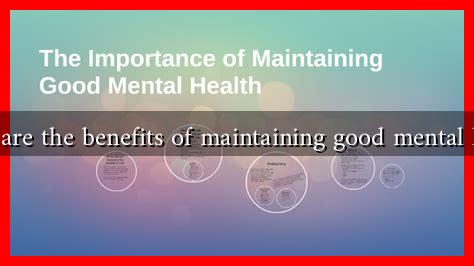-
Table of Contents
The Benefits of Maintaining Good Mental Health
Mental health is an essential component of overall well-being, influencing how we think, feel, and act. It affects our ability to handle stress, relate to others, and make choices. In recent years, the importance of mental health has gained significant attention, with research highlighting its profound impact on various aspects of life. This article explores the benefits of maintaining good mental health, supported by statistics, examples, and case studies.
Understanding Mental Health
Mental health encompasses emotional, psychological, and social well-being. It affects how we think, feel, and behave in daily life. Good mental health is more than just the absence of mental illness; it involves a state of well-being where individuals can cope with the normal stresses of life, work productively, and contribute to their communities.
Benefits of Good Mental Health
Maintaining good mental health offers numerous benefits that can enhance various aspects of life. Here are some key advantages:
- Improved Physical Health: Mental health and physical health are closely linked. According to the World Health Organization (WHO), individuals with good mental health are more likely to engage in healthy behaviors, such as regular exercise and balanced nutrition, which can lead to better physical health outcomes.
- Enhanced Productivity: Good mental health can significantly boost productivity at work or school. A study by the American Psychological Association found that employees with high levels of mental well-being are more engaged, motivated, and efficient in their tasks.
- Better Relationships: Individuals with good mental health tend to have healthier relationships. They are more capable of communicating effectively, resolving conflicts, and showing empathy towards others, which fosters stronger connections.
- Resilience to Stress: Good mental health equips individuals with the tools to cope with stress and adversity. Resilient individuals can bounce back from challenges and maintain a positive outlook, which is crucial in today’s fast-paced world.
- Increased Life Satisfaction: People who prioritize their mental health often report higher levels of happiness and life satisfaction. A survey conducted by the National Institute of Mental Health (NIMH) found that individuals who engage in self-care practices, such as mindfulness and therapy, experience greater overall well-being.
Case Studies and Statistics
Several case studies and statistics illustrate the benefits of maintaining good mental health:
- A study published in the Journal of Happiness Studies found that individuals who practiced mindfulness meditation reported lower levels of anxiety and depression, leading to improved overall mental health.
- The Mental Health Foundation reported that 1 in 4 people in the UK will experience a mental health problem each year. However, those who actively engage in mental health practices, such as therapy and social support, are less likely to experience severe symptoms.
- In a corporate setting, a case study of a tech company that implemented mental health programs showed a 30% reduction in employee absenteeism and a 25% increase in productivity within a year.
Strategies for Maintaining Good Mental Health
To reap the benefits of good mental health, individuals can adopt various strategies:
- Practice Self-Care: Engage in activities that promote relaxation and well-being, such as exercise, hobbies, and spending time with loved ones.
- Seek Professional Help: Don’t hesitate to reach out to mental health professionals for support when needed. Therapy can provide valuable tools for managing stress and emotions.
- Build a Support Network: Surround yourself with supportive friends and family who can provide encouragement and understanding during tough times.
- Stay Informed: Educate yourself about mental health issues and resources available in your community. Knowledge can empower you to take proactive steps towards maintaining your mental well-being.
Conclusion
Maintaining good mental health is crucial for leading a fulfilling and productive life. The benefits extend beyond individual well-being, positively impacting relationships, work performance, and physical health. By prioritizing mental health through self-care, professional support, and community engagement, individuals can enhance their quality of life and resilience against challenges. As we continue to navigate the complexities of modern life, recognizing and nurturing our mental health is more important than ever.

